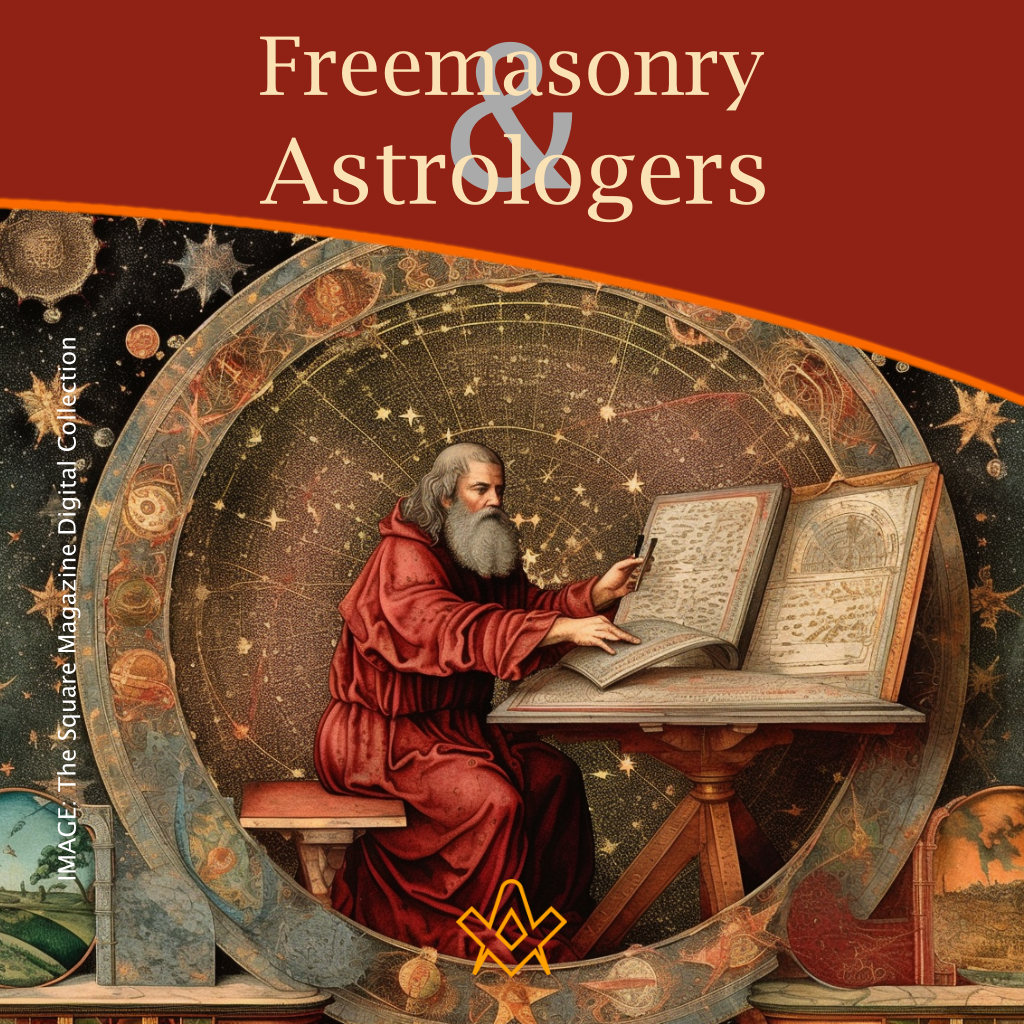Unlocking the Mysteries: The Surprising Connection Between Freemasonry and Astrologers Revealed! Delve into the intriguing world of Freemasonry and explore its ties to astrological practices.
Discover how these two distinct realms intersect, offering a fascinating glimpse into the esoteric interests of some Freemasons. Uncover the hidden links and unravel the enigmatic bond between Freemasonry and astrologers!
The connection between Freemasonry and astrologers has fascinated people for centuries. Freemasonry, a secretive society whose origins date back to the medieval guilds of stonemasons, has long been surrounded by myths, legends, and conspiracy theories.
Astrology, on the other hand, is an ancient practice based on the belief that celestial events can provide insight into human affairs and behavior.
Although some individuals who are Freemasons may also have an interest in astrology, the two systems are distinctly separate in their principles and teachings.
In this article, we will analyze the history and beliefs of both Freemasonry and astrology, explore the possible reasons behind the perceived connection, and provide a comprehensive understanding of the relationship between these two subjects.
The History of Freemasonry – Origins and Evolution: Freemasonry as we know it today can be traced back to the operative masons of the 14th century, who worked on the construction of medieval cathedrals in Europe.
Over time, these stonemasons’ guilds started to admit members who weren’t involved in the masonry trade, known as speculative masons.
Instead, these new members joined the guild for the intellectual, moral, and philosophical teachings, transforming the operative guilds into a worldwide fraternal organization.
With the formation of the Grand Lodge of England in 1717, the modern era of Freemasonry began. Nowadays, it is a global brotherhood of men who uphold the principles of morality, tolerance, and charity, with millions of members worldwide.
Understanding Astrology – Its Basis and Influence: Astrology dates back thousands of years, with its origins found in ancient civilizations such as Babylon, Egypt, and Greece. It is based on the idea that the positions and movements of celestial bodies can influence human affairs and the natural world.
Astrologers study the relationships between the stars and planets and create charts to provide insight and predictions about an individual’s behavior, personality, and future.
Throughout history, astrology has been both revered and vilified, with its practice ebbing and flowing according to cultural and religious trends. Nonetheless, astrology remains a popular belief system for many today.
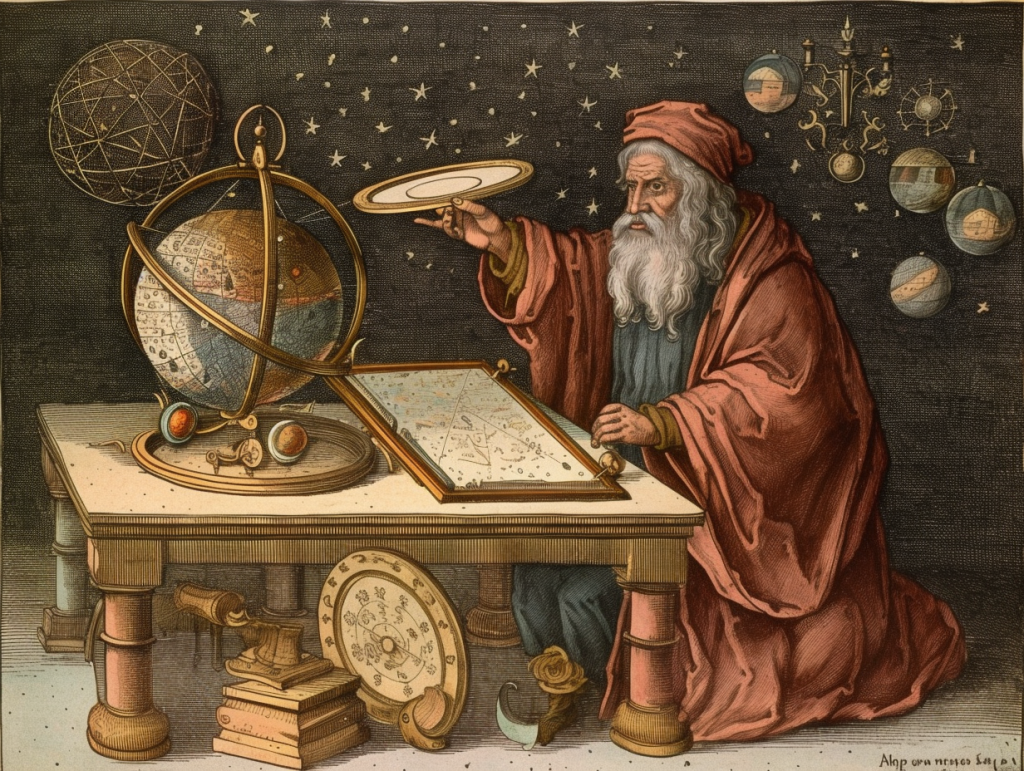
IMAGE: the square magazine digital collection Attribution 4.0 International (CC BY 4.0)
Occult and Esoteric Elements: The fascination with the connection between Freemasonry and astrology may arise from the overlap in their esoteric and occult elements. Both Freemasonry and astrology involve the study of ancient symbols and philosophies, which have been passed down through generations.
Though Freemasonry does not directly endorse astrology, some of its rituals and symbols can be linked with celestial themes and astrological concepts. For instance, various Masonic symbols often feature the sun, moon, and stars.
Influence of Noteworthy Freemasons: Some Freemasons throughout the history have been prominent astrologers or had a deep interest in astrology. These individuals have inadvertently fueled the perception that Freemasonry and astrologers are closely connected.
For example, Dr. John Dee, a 16th-century mathematician, astronomer, and astrologer, is said to have been a member of a Masonic fraternity in England. Dee played a crucial role in the growth of astrology in the English-speaking world and was an advisor to Queen Elizabeth I.
Symbolism and Ritual in Freemasonry: Freemasonry is rich with symbols and allegorical teachings designed to represent profound moral and philosophical concepts.
These symbols often have multiple layers of meaning and can be traced back to various religious and spiritual traditions. Some elements of Masonic symbolism share similarities with astrological symbolism, which could be another reason behind the perceived connection between the two.
For example, as stated earlier, Freemasonry uses the sun, moon, and stars in some of its symbols. The sun is often associated with enlightenment and divine wisdom, while the moon represents the passage of time and knowledge acquired through experience.
Similarly, astrology attributes unique meanings to celestial bodies, with each planet and celestial event symbolizing different aspects of human affairs.
Conspiracy Theories and Speculation: The connection between Freemasonry and astrologers has been fueled by rampant speculation and conspiracy theories.
Freemasonry’s secretive nature and initiation rituals have been a magnet for those who believe there is an underlying connection between the fraternity and various occult practices, including astrology, alchemy, and even the Illuminati.
Freemasonry and Astrology: Distinct Systems with Unique Perspectives: Having analyzed the perceived connections, it’s clear that astrology and Freemasonry are distinct systems in their own right.
While some individuals who are Freemasons may have an interest in astrology, it’s essential to recognize that their Masonic affiliation does not define or drive this interest.
Freemasonry: A Fraternal Organization: Freemasonry’s primary focus is on fostering brotherly love, relief, and truth among its members. The fraternal organization promotes the values of morality, tolerance, and charity through the use of allegorical symbols and rituals. People from various religious and philosophical backgrounds can become Freemasons, as the organization accepts members who believe in a Supreme Being but does not impose a specific religious creed.
Astrology: A Belief System and Practice: In contrast, astrology is a belief system focused on understanding human affairs and behavior through the study of celestial events. It relies on the interpretation of astrological charts to provide insights into an individual’s life.
Although some of Freemasonry’s symbols may be related to celestial themes, there is no specific or official connection between the two fields.
The overlap in symbolism, shared interests of individual Freemasons, and historic association with prominent astrologers all contribute to the perceived connection between Freemasonry and astrologers.
Conclusion: The connection between Freemasonry and astrologers may appear intriguing, but a comprehensive analysis shows that the two are unique in their purpose and practice.
While some Freemasons may have personal interests in astrology, it’s vital to understand that Freemasonry as an organization neither endorses nor promotes any specific religious or occult practices, including astrology.
Ultimately, the relationship between Freemasonry and astrologers is largely one of individual pursuits, coexisting side by side without direct or organizational connection.
Here are short biographies for renowned ancient Astrologers:
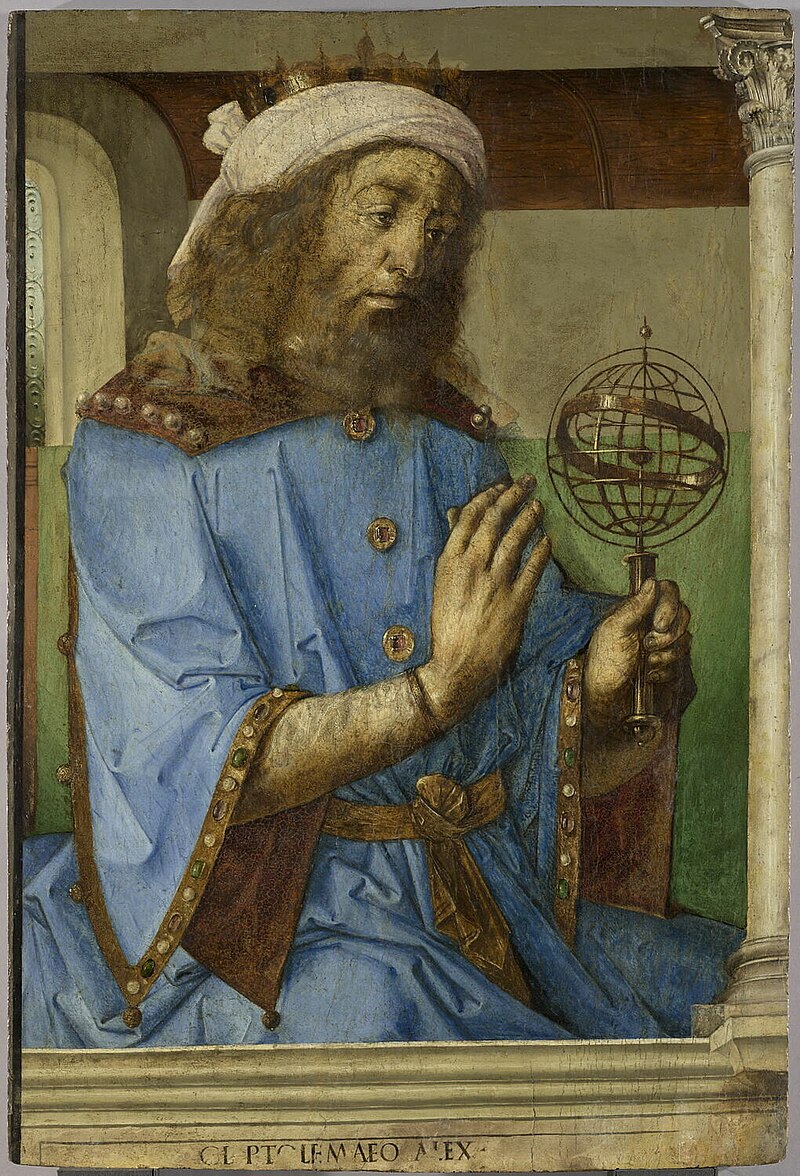
Claudius Ptolemy
IMAGE LINKED: wikimedia Attribution 4.0 International (CC BY 4.0)
Ptolemy (c. 2nd century CE): Claudius Ptolemy was a Greek astronomer, mathematician, and astrologer who lived in Alexandria, Egypt, during the 2nd century CE. He is best known for his influential work “Tetrabiblos,” which synthesized the Hellenistic astrological tradition.
Ptolemy’s work laid out the principles and techniques of astrology and became a foundational text in the field. His contributions to astronomy include the geocentric model of the solar system, which was widely accepted until Copernicus’s heliocentric model.

Page from a 15th-century Egyptian ms. of ‘Kitâb al-Mawâlid’ (‘The Book of Nativities’) by Abu Ma’shar (Albumasar).
IMAGE LINKED: wikimedia Attribution 4.0 International (CC BY 4.0)
Abu Ma’shar (787–886 CE): Abu Ma’shar, also known as Albumasar, was a Persian astrologer and astronomer who lived during the Islamic Golden Age.
He was born in Balkh, in present-day Afghanistan. Abu Ma’shar authored numerous works on astrology and was particularly influential in the Islamic world.
His works covered various astrological topics, including natal astrology, horary astrology, and medical astrology.
His writings integrated Hellenistic and Persian astrological traditions, and his work was widely studied and translated into Latin and other languages.

An Iraqi postage stamp of 6 money issued in 1962 on the occasion of the millennium anniversary of the founding of the city of Baghdad and in memory of the philosopher Yacoub bin Ishaq Al-Kindi.
IMAGE LINKED: wikimedia Attribution 4.0 International (CC BY 4.0)
Al-Kindi (801–873 CE): Al-Kindi, whose full name was Abu Yūsuf Yaʻqūb ibn ʼIsḥāq al-Kindī, was an Arab philosopher, scientist, and astrologer.
He lived during the Islamic Golden Age and made significant contributions to various fields, including astronomy and astrology.
Al-Kindi was renowned for his translations of Greek philosophical and scientific texts, including astrological works.
He sought to integrate Greek and Islamic knowledge, and his writings explored the relationship between celestial phenomena and human affairs.
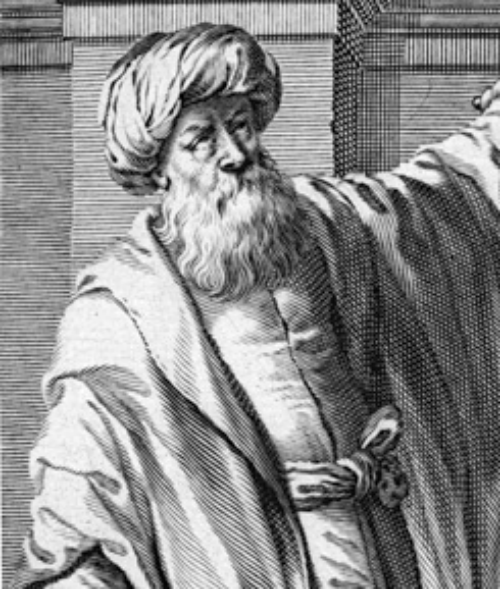
Cropped version of the frontispiece of Johannes Hevelius, Selenographia, depicting Ibn al-Haytham (Alhazen)
IMAGE LINKED: wikimedia Attribution 4.0 International (CC BY 4.0)
Abu Ali al-Hasan ibn al-Haytham (Alhazen) (965–1040 CE): Alhazen, born in Basra (in present-day Iraq), was an Arab polymath, astronomer, and physicist.
While he is primarily known for his contributions to optics and the scientific method, Alhazen also engaged in astrological studies.
He wrote on topics such as the influences of the planets and celestial events on human lives. Alhazen’s works were influential in the Islamic world and later in Europe.
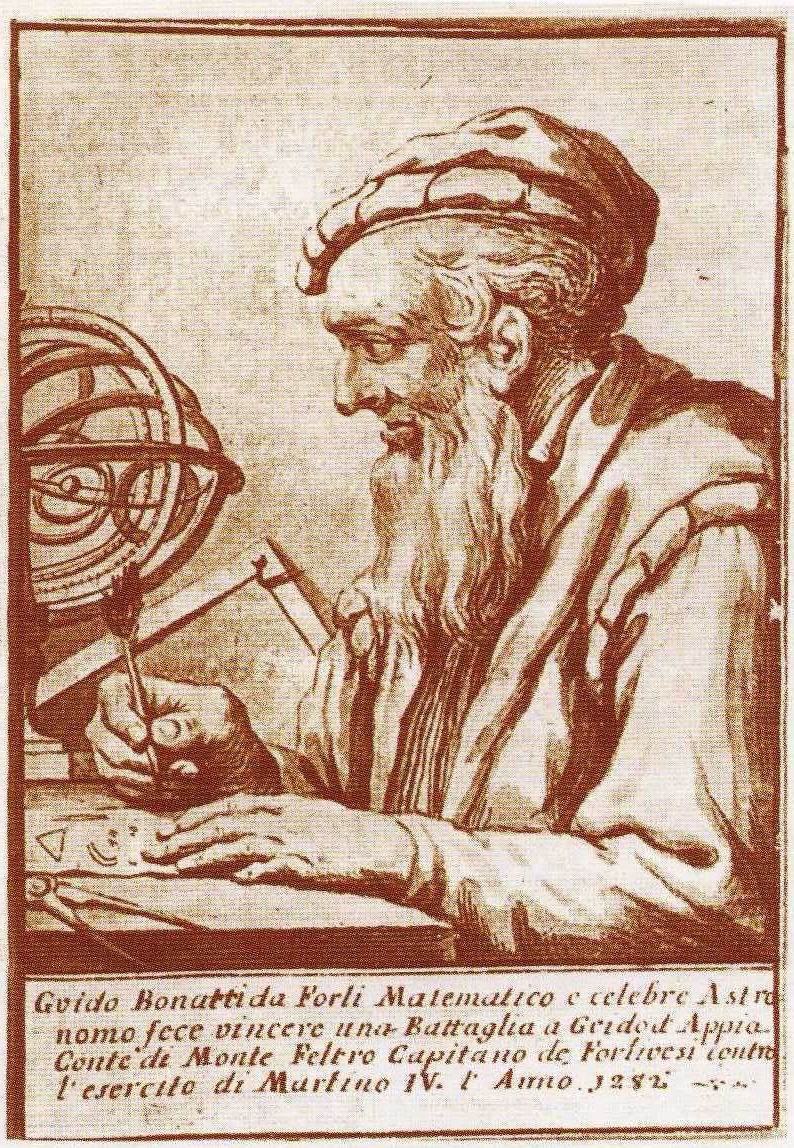
Guido Bonatti, anonymous 18th-century engraving.
IMAGE LINKED: wikimedia Attribution 4.0 International (CC BY 4.0)
Guido Bonatti (c. 13th century CE): Guido Bonatti was an Italian astrologer who lived during the 13th century.
He served as an astrologer and advisor to various rulers, including the Duke of Ferrara and Holy Roman Emperor Frederick II. Bonatti’s most notable work, “Liber Astronomiae” (Book of Astronomy), covered various aspects of astrology, including natal astrology, mundane astrology, and electional astrology.
His work became popular in Europe and was translated into several languages.

Portrait of Johannes Kepler.
IMAGE LINKED: wikimedia Attribution 4.0 International (CC BY 4.0)
Johannes Kepler (1571–1630 CE): Johannes Kepler was a German mathematician, astronomer, and astrologer.
He is primarily known for his groundbreaking work in astronomy and his formulation of Kepler’s laws of planetary motion.
However, Kepler was also an avid astrologer and practiced astrology throughout his life. He developed new astrological theories and methods, including exploring the relationship between planetary positions and events on Earth.
Kepler’s astrological work was influential during his time and had an impact on later astrologers.
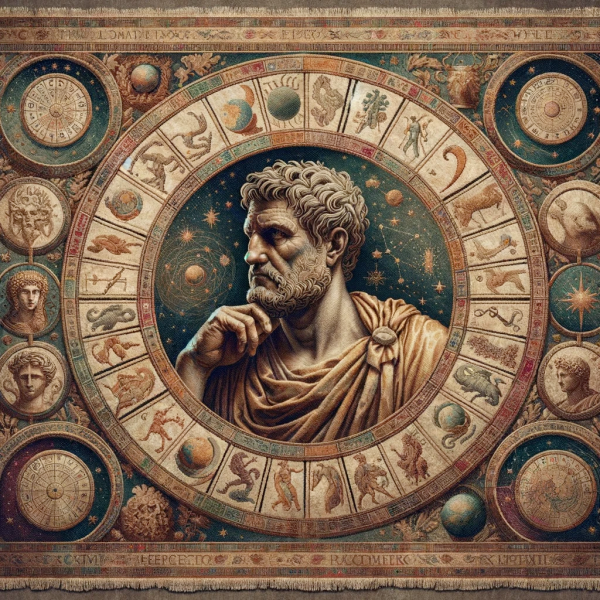
likeness of Vettius Valens (c. 2nd century CE):
IMAGE LINKED: wikimedia Attribution 4.0 International (CC BY 4.0)
Vettius Valens (c. 2nd century CE): Vettius Valens was a Roman astrologer who lived during the 2nd century CE.
He is best known for his comprehensive astrological work titled “Anthology,” also known as the “Five Books of Masha’allah.” Valens’ work covers a wide range of astrological techniques and principles, including natal astrology, predictive techniques, and mundane astrology.
He synthesized various astrological traditions, including Hellenistic and Mesopotamian influences. Valens’ work served as a valuable source of astrological knowledge during the Hellenistic period and continues to be studied by modern astrologers.
Each of these astrologers made significant contributions to the field of astrology in their respective eras. Their writings and teachings helped shape the understanding and practice of astrology throughout different cultures and time periods.
Article by: Margaret S.

Margaret S. is a retired lecturer and devotes much of her time to theological and philosophical writing.
She was made a Freemason in the International Order of Freemasonry for Men and Women - Le Droit Humain.
(Margaret S. is her pen name for all her masonic papers)
Recent Articles: Esoteric series
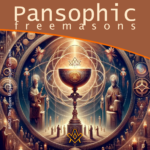 Unveil the secrets of Pansophic Freemasonry, a transformative journey through the ancient mystical traditions. Delve into the sacred realms of Rosicrucianism, Templar wisdom, Kabbalah, Gnosticism, and more. Discover the Graal, the sacred Grail that connects all esoteric paths. Embrace a holistic spiritual quest that reveals the profound mysteries of self and the universe. |
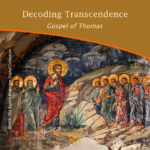 Dive into a spiritual journey where self-awareness is the key to enlightenment. The Gospel of Thomas and Masonic teachings converge on the profound truth that the path to transcendent wisdom lies within us. Embrace a diversified understanding of spirituality, emphasizing introspection as the gateway to a universally respected enlightenment. Explore, understand, transcend. |
 Philosophy the Science of Estimating Values Philosophy is the science of estimating values. The superiority of any state or substance over another is determined by philosophy. By assigning a position of primary importance to what remains when all that is secondary has been removed, philosophy thus becomes the true index of priority or emphasis in the realm of speculative thought. The mission of philosophy a priori is to establish the relation of manifested things to their invisible ultimate cause or nature. |
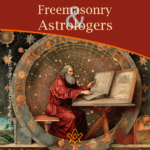 Unlocking the Mysteries: The Surprising Connection Between Freemasonry and Astrologers Revealed! Delve into the intriguing world of Freemasonry and explore its ties to astrological practices. Discover how these two distinct realms intersect, offering a fascinating glimpse into the esoteric interests of some Freemasons. Uncover the hidden links and unravel the enigmatic bond between Freemasonry and astrologers! |
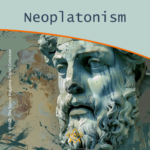 Neoplatonism, a philosophy with profound influence from the 3rd to the 6th century, merges Platonic ideals with Eastern thought, shaping Western and Middle-Eastern philosophy for two millennia. It emphasizes the unity of the individual with the supreme 'One', blending philosophy with theology and impacting major religious and philosophical movements, including Christianity and Islam. |
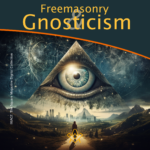 The enigmatic allure of Freemasonry's ancient rituals and Gnosticism's search for hidden knowledge capture the human spirit's endless quest for enlightenment. Between the stonemason's square and the Gnostic's divine spark lies a tantalizing intersection of philosophy, spirituality, and the pursuit of esoteric wisdom. Both traditions beckon with the promise of deeper understanding and moral elevation, inviting those who are drawn to unravel the tapestries of symbols and allegories. Whether through the fellowship of the lodge or the introspective journey of the soul, the paths of Freemasonry and Gnosticism represent a yearning to connect with something greater than ourselves—an impulse as old as time and as compelling as the mysteries they guard. |
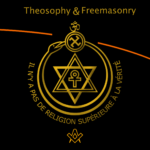 Embark on a journey through time and spirituality with our in-depth exploration of the Theosophical Society's Seal. This ancient emblem, rich with symbols, bridges humanity with the cosmos, echoing through the world's great faiths and diverse cultures. Our paper delves into the six mystical symbols, untangling their profound meanings and tracing their presence in historic art worldwide. Unaffiliated with worldly movements, these symbols open a window to esoteric wisdom. We also probe potential parallels with Freemasonry, seeking threads that might connect these storied organizations. Join us in unveiling the universal language of the spirit encoded within this enigmatic Seal. |
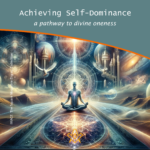 Discover the pathway to divine oneness through the concept of self-dominance. This thought-provoking essay explores the profound connection between self-control, spiritual growth, and achieving unity with the divine essence. With an interdisciplinary approach, it offers practical steps towards expanding consciousness and deepening our understanding of the divine. |
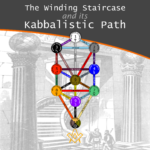 The Winding Staircase and its Kabbalistic Path The Winding Staircase in freemasonry is a renowned symbol of enlightenment. In this article, we explore its connection to Kabbalistic thought and how it mirrors the inner growth of a candidate as he progresses throughout his Masonic journey. From faith and discipline in Binah, to strength and discernment in Geburah, and finally to victory and emotional intuition in Netzach, each step represents a crucial aspect of personal development. Join us as we delve into the esoteric meanings of this powerful symbol. |
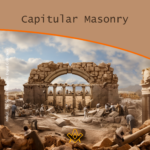 Unravel the mystic origins of Capitular Masonry, a secretive Freemasonry branch. Explore its evolution, symbolic degrees, and the Royal Arch's mysteries. Discover the Keystone's significance in this enlightening journey through Masonic wisdom, culminating in the ethereal Holy Royal Arch. |
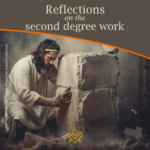 Reflections on the Second Degree Work Bro. Draško Miletić offers his reflections on his Second Degree Work – using metaphor, allegory and symbolism to understand the challenges we face as a Fellow Craft Mason to perfect the rough ashlar. |
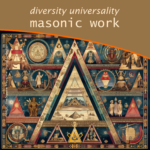 Diversity and Universality of Masonic Work Explore the rich tapestry of Masonic work, a testament to diversity and universality. Uncover its evolution through the 18th century, from the stabilization of Symbolic Freemasonry to the advent of Scottish rite and the birth of Great Continental Rites. Dive into this fascinating journey of Masonic systems, a unique blend of tradition and innovation. Antonio Jorge explores the diversity and universality of Masonic Work |
 Nonsense as a Factor in Soul Growth Although written 100 years ago, this article on retaining humour as a means of self-development and soul growth is as pertinent today as it was then! Let us remember the words of an ancient philosopher who said, when referring to the court jester of a king, “It takes the brightest man in all the land to make the greatest fool.” |
 Freemasonry: The Robe of Blue and Gold Three Fates weave this living garment and man himself is the creator of his fates. The triple thread of thought, action, and desire binds him when he enters into the sacred place or seeks admittance to the Lodge, but later this same cord is woven into the wedding garment whose purified folds shroud the sacred spark of his being. - Manly P Hall |
 By such a prudent and well regulated course of discipline as may best conduce to the preservation of your corporal and metal faculties in the fullest energy, thereby enabling you to exercise those talents wherewith god has blessed you to his glory and the welfare of your fellow creatures. |
 Jacob Ernst's 1870 treatise on the Philosophy of Freemasonry - The theory of Freemasonry is based upon the practice of virtuous principles, inculcating the highest standard of moral excellence. |
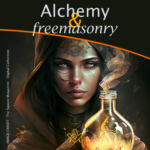 Alchemy, like Freemasonry, has two aspects, material and spiritual; the lower aspect being looked upon by initiates as symbolic of the higher. “Gold” is used as a symbol of perfection and the earlier traces of Alchemy are philosophical. A Lecture read before the Albert Edward Rose Croix Chapter No. 87 in 1949. by Ill. Bro. S. H. Perry 32° |
 The spirit of the Renaissance is long gone and today's globalized and hesitant man, no matter ideology and confession, is the one that is deprived of resoluteness, of decision making, the one whose opinion doesn't matter. Article by Draško Miletić, |
 A Mason's Work in the First Degree Every Mason's experiences are unique - here writer and artist Draško Miletić shares insights from his First Degree Work. |
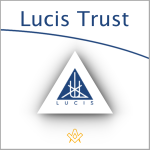 Initiation and the Lucis Trust The approach of the Lucis Trust to initiation may differ slightly to other Western Esoteric systems and Freemasonry, but the foundation of training for the neophyte to build good moral character and act in useful service to humanity is universal. |
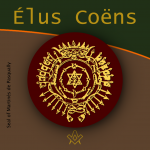 Who were the mysterious 18th century Élus Coëns – a.k.a The Order of Knight-Masons Elect Priests of the Universe – and why did they influence so many other esoteric and para-Masonic Orders? |
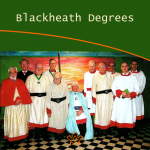 Bro. Chris Hatton gives us his personal reflections on the history of the 'house at Blackheath and the Blackheath Orders', in this wonderful tribute to Andrew Stephenson, a remarkable man and Mason. |
 Book Review - Cagliostro the Unknown Master The book review of the Cagliostro the Unknown Master, by the Editor of the book |
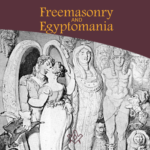 We explore fascinating and somewhat contentious historical interpretations that Freemasonry originated in ancient Egypt. |
 Is Freemasonry esoteric? Yes, no, maybe! |
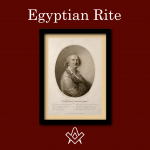 Egyptian Freemasonry, founder Cagliostro was famed throughout eighteenth century Europe for his reputation as a healer and alchemist |
masonic knowledge
to be a better citizen of the world
share the square with two brothers

click image to open email app on mobile device
